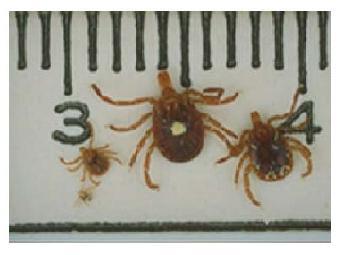
Section Branding
Header Content
Ticks Among Us
Primary Content

The experts are saying that it is a bad year for ticks. Which really means that the ticks are having a banner year and their prey are having a bad year. Nancy Hinkle, a veterinary entomologist at the University of Georgia's Department of Entomology told The Athens Banner-Herald that "we're seeing ticks in greater numbers than we've seen in the last decade." The general thought behind this is that experts know that a colder, harsher winter kills off many ticks; and this year’s mild winter and early spring have likely given the arachnids the boost to be out in such great numbers this year.
Yes, arachnids. That’s spiders. They live on the blood of mammals, and sometimes even reptiles and amphibians. That image is basically one of my biggest fears: a snake that is extra angry because it has a tick (read “spider”) on it! (I do understand that snakes and spiders are not generally “angry” and play important roles in the ecosystem. They also inspire much fear in me.)
The good news is that there are several ways to prevent tick bites. The Georgia Department of Public Health
offers these:
• Wear light‐colored clothing so that crawling ticks can be easily seen.
• Wear pants and long sleeves to reduce skin exposure to ticks.
• Tuck pants into socks and shirts into pants to prevent ticks from crawling up pants legs.
• Apply insect repellent containing DEET to exposed skin, and permethrin to clothing.
• After spending time outdoors, thoroughly inspect your body for crawling or attached
ticks.
The Department of Public Health has a lot more information about ticks available on the internet, including how to remove a tick and images of ticks so that you know what to look for.
The Centers for Disease Control (CDC), located in Atlanta, GA, offer ways to prevent ticks in your yard:
•Modify your landscape to create Tick-Safe Zones. Regularly remove leaf litter and clear tall grasses and brush around homes, and place wood chips or gravel between lawns and wooded areas to keep ticks away from recreational areas, and keep play areas and playground equipment away from away from shrubs, bushes, and other vegetation.
•Consider using a chemical control agent. Effective tick control chemicals are available for use by the homeowner, or they can be applied by a professional pest control expert, and even limited applications can greatly reduce the number of ticks. A single springtime application of acaricide can reduce the population of ticks that cause Lyme disease by 68–100%.
•Discourage deer. Removing plants that attract deer and constructing physical barriers may help discourage deer from entering your yard and bringing ticks with them.
•Use medicated treatments to prevent ticks on your pets. This will protect your pets and prevent ticks from entering your home via your pets.
After researching this issue, I have an intense desire to hardscape my yard and wear white, elastic-banded sweat suits around when outdoors all summer. However, the tips from the Department of Public Health and CDC provide great comfort in the ability to prevent ticks from being an issue.
The experts are saying that it is a bad year for ticks. Which really means that the ticks are having a banner year and their prey are having a bad year.





